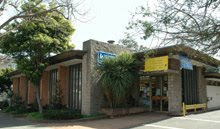 |
Christopher Hewitt
(Credit: Richard Kanuck) |
Christopher Hewitt was a
gay poet, disabled activist, recovering alcoholic, editor, and college
teacher. His writing is often autobiographical and addresses the issues of disability, discrimination,
and communication, among others. The
Hewitt Papers (GLC 67) document his life and work. The collection includes poetry, prose, correspondence,
journals and diaries,
photographs, sketches, drawings, and audio-visual materials.
 |
| Mightier Than The Mouth |
Born on February 2, 1946
in Nottingham, Hewitt grew up in the villages of Welland
and Upton-on-Severn in
Worcestershire, England. He was born with a brittle bone condition
called osteogenesis imperfecta and
used a wheelchair from the age of
nine. He came to the United States for university and lived and worked in the U.S. until his death in 2004.
Hewitt received an
M.A. in English from the University of California, Davis in 1976, and an
M.F.A . in Poetry at the University
of Iowa Writers' Workshop in
1981. He taught creative writing and English at Fordham University, John
Jay College, and University
of San Francisco.
 |
| Love's Fool |
He was also Associate Editor of
Art & Understanding, a magazine in which writers and artists respond to the AIDS crisis. One
folder contains writing by others that Hewitt considered for publication
in
The James White Review,
Able-Together, or
Art & Understanding.
Hewitt was gregarious
and had the ability to engage people he did not know in
conversation. A frequent denizen at Cafe Flore in San Francisco's Castro neighborhood,
Chris titled one of his poetry cycles "Cafe Society." He published chapbooks of poetry, including
The Careless Days, and
The Infinite Et Cetera, and his poems appeared in
such publications as
The New Yorker,
The American Poetry Review,
Salmagundi, and
Cimarron Review.
 |
| Interview with Armistead Maupin |
Hewitt wrote the libretti for two song cycles,
Metamorphosis and
Amours, music by Benton Hess, which were performed in New York City and Oberlin, Ohio. He also wrote the libretto for a cantata
Cantata V: Raggedstone Hill, music by Dennis Riley, which was performed in New York City. Hewitt was asked to provide an introductory poem for
The Great Spangled Fritillary by Andrew Thomas. The collection includes an audiorecording of
Seeing with the Heart, with music by Richard Maltz and text by Hewitt.
 |
"Of Course I Have My Regrets"
drawing by Hewitt |
Often
Hewitt's writing draws from his own experience. There is a notebook with
drafts of Hewitt's memoir
Brittle Bones, a more final
version of the same in the typescripts, and an audiotape with a reading
of Chapter One in Series
7. Some of Hewitt's writing
touches on his recovery from alcoholism, his work with people with HIV
and AIDS, and interviews with
writers such as Armistead
Maupin, Paul Reed, and Ruth Felt.
The papers contain sketches and drawings by Hewitt, a small mounted
painting by his mother J. M. Hewitt, and some
printed posters by others.
Several of the drawings by Hewitt have satirical captions. Many of the
drawings are unsigned.
 |
| The Lifting Team |
The collection contains three VHS tapes: one is a portrait of Hewitt,
another is a reading by Hewitt. The third,
Crip Shots, is a short documentary
film with portraits of artists
with disabilities. It features Judy Smith, Greg Walloch, Chris Hewitt,
Bill Shannon, and Terry
Galloway. There are also audiocassette tapes of readings and interviews by Hewitt. These include performances of
The Blaspheming Moon and
Seeing With The Heart.
Hewitt died due to complications from pneumonia on July 13, 2004 in San
Francisco. He was survived by his mother Joan Hewitt. Hewitt's Papers were donated to the library by Robert Guter, September 29, 2005.
 |
| "Chris typing" (uncredited photo) |
The Christopher Hewitt Papers (GLC 67) are available through the
San Francisco History Center, 6th floor, Main Library. The photographs are available during the hours for the
San Francisco Historical Photograph Collection.








